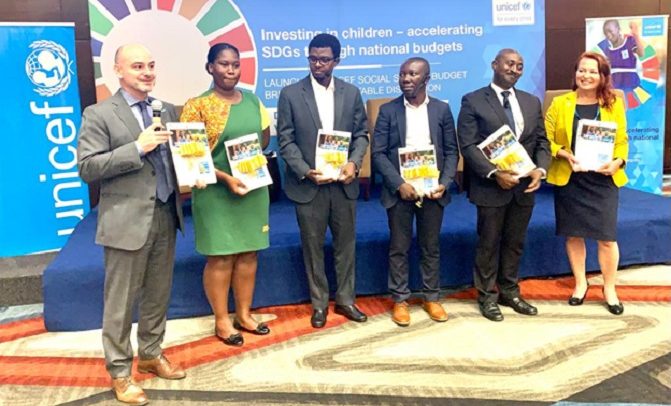Officials with the budget briefs
The United Nations Children’s Fund (UNICEF) has urged the government to expand social sector investments especially for children.
The UN agency said it is important for the government to ensure that children are at the core of budgetary decisions calling for urgency in finding more innovative solutions to create fiscal space, including through private sector engagement.
According to data presented at a budget brief launch and roundtable themed, “Investing in Children – Accelerating SDGs through National Budgets,” the overall social sector budgets declined as a percentage of total government spending in 2023 from 21.1 % in 2022 to 18.2 % in 2023.
If further indicated that the current level of revenues make it difficult for the government to adequately finance social sector investments as it needs to finance other essential functions.
“Taken together, international targets for social sector spending comprise as least 12%-15% of GDP while Ghana’s social expenditure is approximately 5.5 % of GDP in 2023,” it said.
UNICEF Deputy Country Representative Fiachra McAsey said Ghana has consistently articulated its commitment to achieve the SDGs by 2030 with the government working consistently over several years with development partners and stakeholders to accelerate efforts.
“Unfortunately, across the world including Ghana, children today live in a world impacted by poly-crises, in which the multifaceted effects of global heating, destabilizing conflicts and humanitarian situations, economic hardship and severe learning loss left in the wake of the COVID-19 pandemic, continue to compound already difficult development the challenges which see SDG attainment pushed further away,” he said.
Mr. McAsey thus noted that investments in children particularly in the social sector should serve as a pathway to accelerate progress against the SDGs.
“Besides, investing in children is not only a moral imperative but also makes sense economically – with several of the most bankable social investments being programmes focused on early childhood development, nutrition and immunization – all of which build human capital accumulation and set course for near future prosperity,” he said.
The Budget brief serves as a very useful tool to better understand current prioritization, across the sectors that matter most for children such as education, health, social and child protection, water and sanitation.
They also offer insights into the efficiency, equity and adequacy of past spending, with the objective to synthesize complex budget information so that it is easily understood by different stakeholders.
By Jamila Akweley Okertchiri

